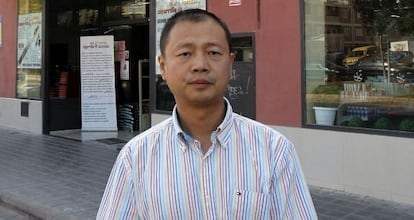Where there’s smoke, there’s ire
The burgeoning e-cigarette industry is making a lot of people large amounts of money But vendors in Spain have a problem: the many patents of Wang Ji

“There’s a Chinese guy wandering around with a notary.” The rumor spread around the trade fair in Valencia last October, eventually reaching the ears of Jeff Mont, a distributor of electronic cigarettes. “People thought it was a joke, but those guys were very serious,” he recalls. “They were taking notes and everything.”
The man was Yi Hu Wang Ji, a 40-year-old Chinese businessman, who settled in Manrises, Valencia, having arrived in Spain as a teenager. At the trade fair, he was carrying a dossier of around 100 certificates issued by the Spanish Brands and Patents Office, with photographs of mouthpieces, batteries, atomizers, rechargers, cases and smokeless cigarettes. His industrial designs are registered in Spain, and he holds exclusive rights to them. After the fair, a few franchises received certified faxes: there would be legal action.
Since that day there has been incredulity and concern in the e-cigarette sector; confusion, too, over how much money Wang Ji is asking the franchises — of which there are around 3,000 in Spain — to stump up. There are reports he is charging 250 euros a month, while he himself admitted in a radio interview that he is asking for 50 euros. “Because we are in a crisis and that way everyone can make money,” he says.
Among the e-cigarette fraternity the feeling is that Wang Ji simply registered models that were already on the market. “It happened so quickly,” says Jeff Mont, who, together with other distributors, is studying a lawsuit against Wang Ji: “I wish I’d thought of it first.”
If only I’d thought of it first,” says one distributor of electronic cigarettes
“Has he been smart? Maybe, but the law is the law, and those who don’t pay are breaking it,” says Vicente Quilis, Wang Ji’s lawyer. “He is willing to negotiate. That’s how this works.”
Some franchise owners have already reached an agreement with Wang Ji. Alejandro Rodríguez Marco owns Happy Smoky, which has 67 outlets. He has created the Spanish Association of Electronic Cigarette Businessmen and signed a contract for the concession of Wang Ji’s rights in exchange for 95 euros a month per shop. “I wanted to stay within the law,” Rodríguez says. “Many families depend on me and now they’re trying to compare us to tobacco…,” he says, in reference to the government’s decision to ban the use of e-cigarettes in hospitals, schools and public buildings.
Belén Delgado is a lawyer, and represents a number of franchises that are questioning Wang Ji’s claim to rights. “He has taken advantage of the system in search of unjust profit,” she says. “The photos he presented in the Patents Office are taken from the internet. In some cases the brand name has been erased with Photoshop. But proving that these models exist and who owns them is a tough job.” Especially given that the e-cigarette sector is booming, with scant regulation in place and most purchases made online. Hundreds of Chinese factories are churning out what is basically the same product.
After his appearance at the trade fair Wang Ji did a round of media interviews in which he claimed he merely wants to bring some order to the chaos of the sector. He says the “idea” came to him when he imported e-cigarettes from China that turned out to be already registered in Spain. Wang Ji elected not to pay the fees and his merchandise was embargoed. But the businessman is not in the mood for telling stories when he speaks to EL PAÍS — Wang Ji is not a happy man. “They have told many lies,” he says, accusing lawyers (including his own), the media and the franchise owners of distortion. “I only want to protect my rights and my product, but because I am Chinese people say I copied and that I am not working within the law.” Will he sue those who refuse to pay up? “It’s not worth it. Whoever wants to pay, they can pay. If they don’t, then so be it.”
He has taken advantage of the system in search of unjust profit”
Wang Ji turns to his friend Javier García, who accompanies him to all media interviews, to explain the situation more clearly. García says that Wang Ji “is an inventor as well as a businessman,” and that during the summer he personally created the hundreds of designs he registered in September. The pieces are made in China and he then sells them in his chain of stores in Spain. García says it is likely that the designs are copied in China and therefore there are many almost identical products on the market.
“Wang Ji has always acted in good faith,” García explains. “We haven’t asked anybody for money in writing, and the best proof of that is that we haven’t seen a single euro. There is no rush. Let them challenge us. Time will show that we are in the right.”
Registering an industrial design is very easy; it can be done online by supplying photographs and paying a fee of 62 euros. A few days later, exclusivity certificates are dispatched. Without including notary fees, certified faxes and payments to his lawyer, Wang Ji has spent at least 12,000 euros on registering his designs. An industrial design is not the same as a patent — which requires a string of evidence to be granted, including proof of exclusive authorship — and protects an invention or concept: in this case, electronic cigarettes. Industrial design certificates protect the appearance of parts of a product, such as a mouthpiece shaped like a skull wearing a cowboy hat and sunglasses. This design exists: it is registered as 518.011-02, to Wang Ji. On the internet, dozens of international distributors are selling a practically identical piece.
Anybody who wishes to challenge a design (for example, if a similar one has been registered) has two months to do so. There are dozens filed against Wang Ji’s designs, including the skull.
“This is a wake-up call for a society with little or no culture of registry,” says Gerardo Penas of the Patents Office, who says he is “grateful” to Wang Ji. “Not everything goes; you have to go through the proper channels before you sell something because there is always an owner behind it.”
Tu suscripción se está usando en otro dispositivo
¿Quieres añadir otro usuario a tu suscripción?
Si continúas leyendo en este dispositivo, no se podrá leer en el otro.
FlechaTu suscripción se está usando en otro dispositivo y solo puedes acceder a EL PAÍS desde un dispositivo a la vez.
Si quieres compartir tu cuenta, cambia tu suscripción a la modalidad Premium, así podrás añadir otro usuario. Cada uno accederá con su propia cuenta de email, lo que os permitirá personalizar vuestra experiencia en EL PAÍS.
¿Tienes una suscripción de empresa? Accede aquí para contratar más cuentas.
En el caso de no saber quién está usando tu cuenta, te recomendamos cambiar tu contraseña aquí.
Si decides continuar compartiendo tu cuenta, este mensaje se mostrará en tu dispositivo y en el de la otra persona que está usando tu cuenta de forma indefinida, afectando a tu experiencia de lectura. Puedes consultar aquí los términos y condiciones de la suscripción digital.









































